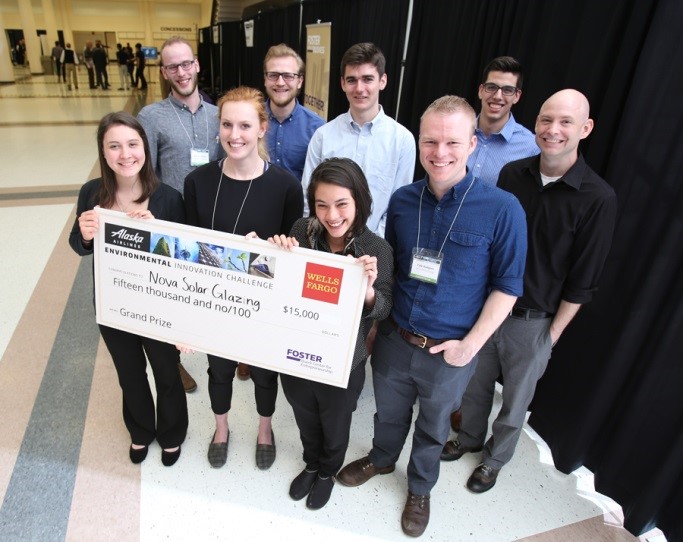 |
|

|
|
On a day wherebeing greenmeant everything, it was a student team highlighting the orange glow of the sun that won the spotlight. Nova Solar Glazing was awarded the $15,000 Wells Fargo grand prize at the 2017 Alaska Airlines Environmental Innovation Challenge hosted by the Foster School’s Buerk Center for Entrepreneurship. The team of electrical engineering, business, chemistry, and industrial design students from Western Washington University developed a luminescent solar concentrator glass pane. It converts current windows into energy-producing solar windows that are both affordable and practical.
Nova Solar Glazing was one of 21 student teams looking to solve environmental and cleantech problems through innovation at the University of Washington competition. The $10,000 Herbert B. Jones Foundation second place prize went to Airy for their battery-free, wireless home security solution that uses sensors mounted on doors or windows to harvest energy. The team featured students from UW’s Department of Electrical Engineering.
The Starbucks $5,000 third place prize was awarded to Lignin Biojet fromWashington State University. The team of business and biological systems engineering students presented a technology that converts Lignin, a natural polymer that’s mainly a byproduct of the paper industry, into biojet fuel to produce a renewable alternative to conventional fuel.
Judges awarded the $5,000 UW Clean Energy Institute clean energy prize, as well as a $1,000 “Judges Also Really Liked” award to Membrion. The team of UW chemical engineering students previously found EIC success in 2016 under the name Ionic Windows. They have continued work on low-cost, high-performance membranes for advanced batteries, fuel cells, and reverse osmosis water desalination applications.
Two other $1,000 “Judges Also Really Liked” awards were handed out to GreenFeed, who developed a way to convert retail food waste into a sustainable, scientifically-formulated fish feed for the agriculture industry, and UW Hyperloop, who are developing a sustainable form of accelerated public transportation that will cut travel times, congestion, and greenhouse gas emissions.
Read more about this year’s EIC on the Foster Blog.